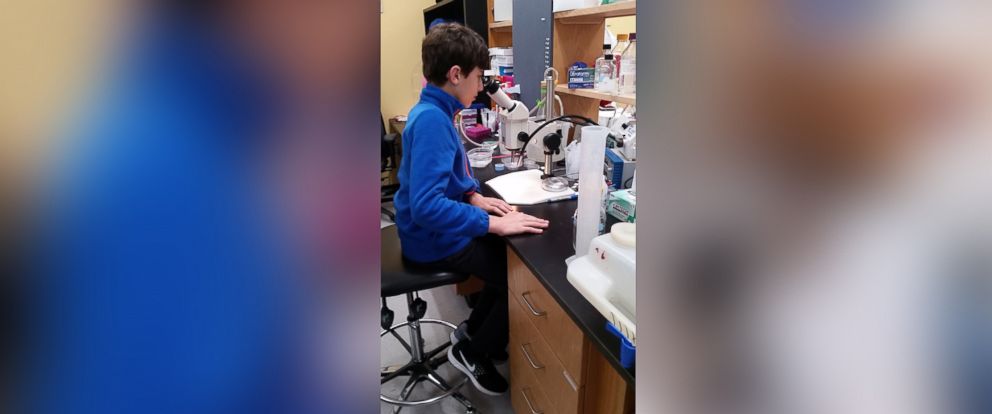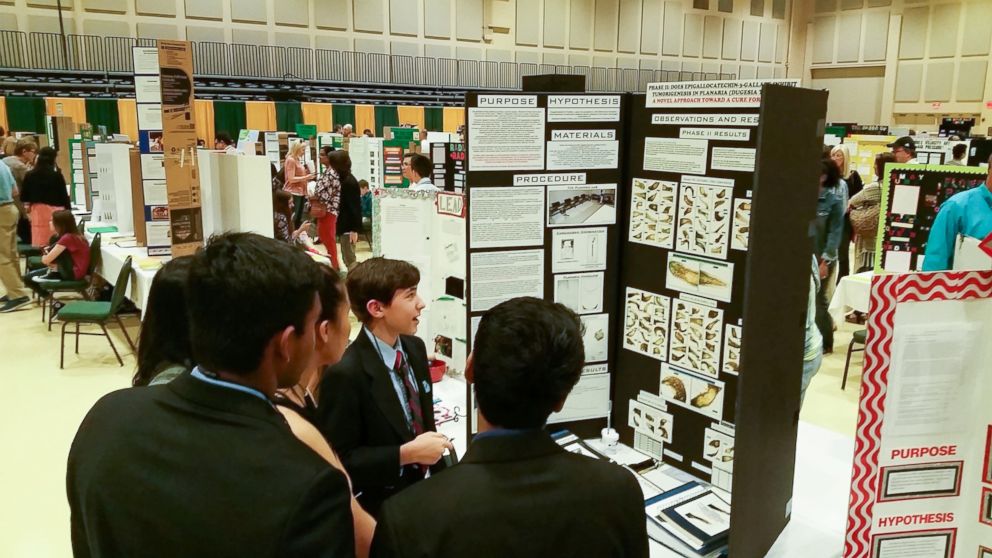7th grader wins awards for 'remarkable' science fair project on cancer research
Stephen Litt examined an antioxidant found in green tea.
— -- A Georgia seventh-grader who was inspired to do a cancer-related science fair project after some of his friends’ moms were diagnosed with breast cancer is being heralded for his project that swept awards at the state’s science fair.
The project, which examined whether an antioxidant found in green tea could prevent breast cancer tumors in planaria, a type of flatworms, also earned Stephen Litt, 12, an invitation to visit a Tufts University research lab over his spring break.
“I'd never actually been to a professional lab before so I thought that was just the most cool part about it because I was actually in a lab,” Stephen told ABC News about his visit to the Boston-area school last week. “I was looking at experiments actually being done.”
The Tufts University professor who helped arrange Stephen’s visit called his science fair project “remarkable” and “absolutely advanced for his age.”
“The work is very interesting and has the potential to advance not only cancer research but regenerative medicine as well,” said Michael Levin, the director of Tuft's Allen Discovery Center. “It was clear that he thought very deeply about these issues.”
Stephen began his research last October after reading about malaria in school. When his dad, Lesley Litt, told him that his malaria plan would not be realistic, he turned his focus to cancer research.

“He did more reading and found an article on green tea, because we like Japanese food, and read that there were antioxidants in green tea that help kill breast cancer,” Litt told ABC News. “We have family friends who’ve had breast cancer and that’s how this all got started.”
Litt added of his son, an avid reader, “I didn’t know he was even reading about that and the next thing I know he has a binder full of articles and research.”
Stephen and his dad found the materials online and set up a research station in the front room of their family home. Stephen used 100 planaria that were divided into four groups.
Over the course of four weeks, one group was exposed to just epigallocatechin-3-gallate, or EGCG, the phytochemical found in green tea, while another was exposed to EGCG for 24 hours and then to two carcinogens for the rest of the four weeks.
The third group of worms was exposed to just the two types of carcinogens while the fourth group was exposed to just spring water.
Stephen documented the results using a microscope that was a present from his grandparents.
“When I was finding out the results, I felt like that was me truly finding out whether my project was successful or not, whether I actually did something, whether I actually helped someone,” he said.
Stephen found the planaria that were exposed to EGCG grew no tumors during the time he observed them.
“By establishing a model of cancer in planaria, Stephen is getting closer to one of the biggest secrets of life: how cells cooperate to build and repair bodies (regeneration) and how that process can fail (resulting in cancer),” said Levin, the Tufts professor. “I was most struck by his mature view of the problem, his creative thought about experiments to do and his methodical approach to answering the question.”
Stephen’s science fair project earned him six awards at the Georgia Science and Engineering Fair this month, including the most outstanding project from a seventh-grader. He also advanced to compete in a national science and engineering competition.

Stephen, who also plays tennis, oboe and is a Boy Scout, was awarded the prizes on April 1, which led to some confusion among his young friends.
“Most of the people I told originally, it was on April 1 so they just didn't believe me,” Stephen said. “They kept on waiting and then my friend Patrick said, 'You never said April Fools’ Day did you?”
Stephen hopes to build on this year's project for his eighth grade science fair project, by examining either "how the EGCG prevented the tumors from forming or looking at more advanced organisms."
"I don't know how to describe it. It just feels good," he said of the time he devotes to research. "I'm doing something important. I'm doing something that is scientific and I'm doing something that could potentially help people."



